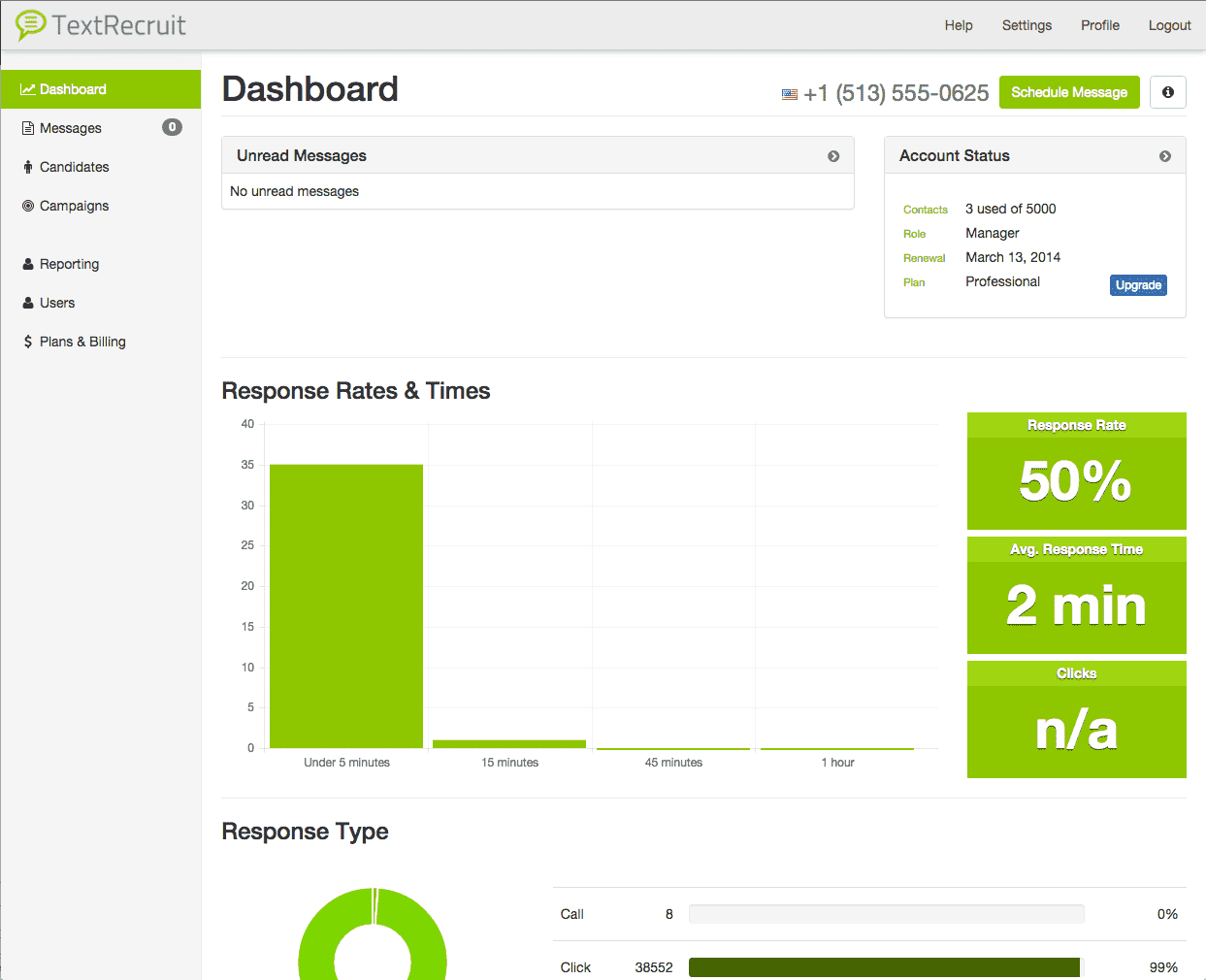social-recruiting
Text Recruiting: Yay or Nay?


Rachel Hill
HireHive

Rachel Hill
HireHive


Rachel Hill
HireHive

Rachel Hill
HireHive
Often, recruiters will use only phone and email to communicate with candidates throughout the recruiting cycle. However, texting could be a valuable addition at certain stages of recruiting. While text recruiting doesn’t suit every business, it does have certain advantages.
From millennials to fully-fledged adults, texting is popular amongst all generations. With apps like Whatsapp and Viber consistently updating their features, texting is clearly an evolving and modern activity. As texting can help you reach multiple target markets, it is a well-suited to candidate communication throughout the recruitment cycle.
Having said this, young adults are far more attached to their smartphones and may be more responsive to text recruiting. Older generations are more prone to viewing the practice as unprofessional. It is best to test all markets and adapt your strategy based on the results.

Much like sales emails, recruiting emails can end up in the dreaded spam folder. However, 99% of people read their text messages! So, if you are looking to increase your candidate response rate, texting may be the way to go.
With so much social media saturation, recruiters need to become more innovative and cut through the noise. According to this blog, only 20% of candidates prefer receiving InMail messages. As text messaging is less common nowadays, you may have a higher chance of standing out and actually getting a response.
While texts may not be the best option for cold outreach, they are great for keeping candidates informed throughout the recruitment process. Use texts to inform candidates of an upcoming interview or send on directions to your office. You come across as highly-responsive and candidates appreciate the regular communication.
Texts can also be a great way of reconnecting with candidates. Let’s say you have a previous candidate who was unsuccessful, but may be suited to some of your current vacancies. Why not send them a polite text to let them know?
As with any recruiting tactic, measurement is key to avoiding wasted time or energy. If you are using an applicant tracking system, it is easy to integrate your text-messaging efforts and measure their success. It is wise though to implement a centralised messaging platform that your whole team can collaborate and report on.
One tool you could use is called Text Recruit; this is an intelligent messaging platform that lets you manage two way communication with candidates. Features include analytics, recruiting shortcodes and intelligent automation. The platform also integrates with most applicant tracking systems, many job boards and LinkedIn.
[caption id="attachment_10893" align="alignnone" width="500"] textrecruit.com[/caption]
textrecruit.com[/caption]
As humans, we sometimes struggle to keep things brief. Email has accommodated the need to send lengthy interview descriptions or interview assignments. However, this same detail doesn’t work well with text.
If you decide to employ text recruiting, keep your messages brief. Use SMS templates to send multiple candidates reminders about upcoming interviews and directions to your office. If you must give more detail, it is best to use email, or even phone.
Generally, people are used to receiving unsolicited emails. The same cannot be said for text. If you find a suitable candidate’s phone number, it may be best to email them first.
This is because cold outreach through text may be deemed intrusive. If you're determined to cold text a candidate, ensure the text is personal for best results. Spamming potential candidates with ‘we are hiring’ texts will only cause further annoyance.
In the same way as you send a professional email to a candidate, you must be professional by text. This means using correct grammar with no abbreviations or emoticons. Just because text is deemed more casual does not mean you should text like an old friend.
Etiquette also means respecting your candidate’s time and texting them at a regular work hour. Texting outside of regular working hours is inappropriate and casts a negative light on your company. You must always remember the credibility of your company.

While the legal requirements surrounding text recruiting are a bit up in the air, take measures to protect the credibility of your company. First of all, use a centralised messaging platform in your company, like Text Recruit. This way all information sent between recruiters and candidates is transparent and law-abiding.
Next, verify the candidate’s identity before texting to combat identity theft. Also ensure that you do not discuss sensitive details via text, like social security numbers. It is better to discuss these details over the phone once you have verified identities.
Lastly, it is perfectly acceptable that some candidates may not want to discuss recruitment matters via text. To provide this option easily, ensure that you have opt-out provisions in place.
Header image credit: huffingtonpost.com
Sign up for our monthly newsletter to receive the latest news, insights, and exclusive resources.

“HireHive makes the team a lot more productive. We’d be lost without it. Team Leaders can do it all themselves if needed or jump in at the right time and know exactly where everything is and what’s happening.”

Hilary Dempsey Head of HR at Life Credit union